O τίτλος φυσικά είναι ειρωνικός. Δεν είναι πρόβλημα το να αλλάζεις γνώμη ή στάση. Όχι όμως και στα πάντα! Ο ΣΥΡΙΖΑ ως αντιπολίτευση δεν έκανε απλώς σκληρή κριτική για την πώληση του Ελληνικού στον Λάτση αλλά κατήγγειλε πομπωδώς σκάνδαλα, προφήτευε εθνικές καταστροφές και δήλωνε εμφατικά πως δεν θα ανεχτεί καμία πώληση σε ιδιώτη. Δεν έλεγε καν "θα επαναδιαπραγματευτούμε μπας και πετύχουμε καλύτερους όρους" για τους οποίους πανηγυρίζει τώρα, τα ήθελε όλα και μόνο δημόσια.
Σήμερα που ο ΣΥΡΙΖΑ γιορτάζει καταχαρούμενος που ιδιωτικοποίησε το Ελληνικό, θυμόμαστε μερικές απ' τις πιο χαρακτηριστικές δηλώσεις όλων τους...
Τσίπρας: «Το Ελληνικό Δεν Πωλείται! Δημόσιο, ανοιχτό πάρκο το Ελληνικό!»
Στις 28.02.2014 το θέατρο "Μίκης Θεοδωράκης" πλημμύρισε από κόσμο, με όλα τα έδρανα κατειλημμένα από φίλους και μέλη του ΣΥΡΙΖΑ που συνέρρευσαν προκειμένου να συμμετάσχουν στην εκδήλωση του ΣΥΡΙΖΑ με τίτλο "Το Ελληνικό Δεν Πωλείται", στην Αργυρούπολη. Έγραφε η Αυγή: Ο ενθουσιασμός ήταν διάχυτος μεταξύ των παρευρισκομένων, ενώ στα "πηγαδάκια", πολλοί έκαναν λόγο για την μεγαλύτερη συγκέντρωση που έχει γίνει ποτέ στην Αργυρούπολη. Εκατοντάδες κόσμου παρακολουθούσε τις ομιλίες όρθιος στα διαζώματα, ενώ πλήθος φίλων του κόμματος βρισκόταν συγκεντρωμένος και έξω από το θέατρο.
Ο Α. Τσίπρας δήλωσε: «Τη μάχη για να μετατραπεί το Ελληνικό σε Μητροπολιτικό Πάρκο, ανοιχτό σε όλους και όλες τους πολίτες του ευρύτερου πολεοδομικού συγκροτήματος, δε πρόκειται να την εγκαταλείψουμε. Δεν θα εγκαταλείψουμε τους πολίτες και το όραμα για ποιότητα ζωής»
Ναι, υπάρχει βίντεο...
«Ας το έχουν όλοι αυτό καλά στο μυαλό τους»
Αλ. Τσίπρας: Το Ελληνικό είναι κατάθεση ψυχής
«Για μας το Ελληνικό δεν είναι ένα πρότζεκτ, αλλά κατάθεση ψυχής, είναι το μοντέλο της αυτοδιαχείρισης, της κινηματικής και συλλογικής δράσης. Είναι η εναλλακτική αντίληψη που έχουμε για την κοινωνία, την οικονομία και το περιβάλλον», σημείωσε ο πρόεδρος του ΣΥΡΙΖΑ Αλέξης Τσίπρας, υπογραμμίζοντας ότι δεν πρόκειται να εγκαταλειφθεί η μάχη για να μετατραπεί το Ελληνικό σε Μητροπολιτικό Πάρκο, ανοιχτό σε όλους και όλες τους πολίτες του ευρύτερου πολεοδομικού συγκροτήματος. Μία αρμονική, λειτουργική και περιβαλλοντική αξιοποίηση ενός σημαντικού αποθέματος δημόσιου, ελεύθερου χώρου, μέσα στο τραυματισμένο πολεοδομικό συγκρότημα της Αθήνας, όπως τόνισε.
Ο Αλ. Τσίπρας επισήμανε ότι το ΤΑΙΠΕΔ είναι ένα απίστευτο σκάνδαλο από μόνο του, ένα εκτροφείο σκανδάλων. «Είναι πρωτοφανές και αδιανόητο, μια κλίκα να αποφασίζει για το μέλλον του δημόσιου πλούτου, δίχως διαφάνεια, δίχως κοινοβουλευτική εποπτεία και έλεγχο, λες και πρόκειται για τα αμπελοχώραφα που κληρονόμησαν από τους παππούδες τους», ανέφερε χαρακτηριστικά και ξεκαθάρισε ότι «όλες οι συμβάσεις, όλες οι παραχωρήσεις δημόσιου πλούτου, θα επανελεγχθούν ως προς τη νομιμότητα και ως προς τη διασφάλιση του δημόσιου συμφέροντος, από τη νέα Βουλή που θα προκύψει από τις εκλογές που σύντομα θα δώσουν εντολή σχηματισμού κυβέρνησης κοινωνικής σωτηρίας, στον ΣΥΡΙΖΑ».
Και συνέχισε: «Ας το έχουν όλοι αυτό καλά στο μυαλό τους». Παράλληλα ο πρόεδρος του ΣΥΡΙΖΑ αναφέρθηκε στους αγώνες που έχουν δώσει τα τελευταία χρόνια οι κάτοικοι του Ελληνικού – και όχι μόνο. «Στο Ελληνικό όλα αυτά τα χρόνια συγκρούονται δύο κόσμοι. Αυτός που υπερασπίζεται με αγώνες το δημόσιο συμφέρον και αυτός που ευνοεί τα ιδιωτικά κερδοσκοπικά συμφέροντα.[...]»
Ρένα Δούρου: Δημόσιο και κοινόχρηστο Πάρκο!
«(...) Η Περιφέρεια Αττικής, με την κατάλληλη πολιτική βούληση, χρησιμοποιώντας ευρωπαϊκά προγράμματα, μπορεί να προωθήσει την πρόταση του Εργαστηρίου Αστικού Περιβάλλοντος του Εθνικού Μετσοβίου Πολυτεχνείου.
Την δημιουργία Μητροπολιτικού, δημόσιου και κοινόχρηστου, Πάρκου, πράσινου, άθλησης και πολιτισμού στο Ελληνικό. Πόλου έλξης, ανοικτού κι εύκολα προσβάσιμου για τους Αθηναίους αλλά και για τουρίστες.
Μια λύση "αναγκαία, εφικτή και φθηνή".
Γιατί το Ελληνικό, με τη μορφή Μητροπολιτικού πάρκου πρασίνου, μπορεί να γίνει η ευκαιρία του Λεκανοπεδίου αλλά και της χώρας. Μέσα από την προώθηση ενός νέου προτύπου ανάπτυξης.
Ενός διαφορετικού μοντέλου ανάπτυξης.
Από τους πολίτες, για τους πολίτες.
Με τη δημιουργία αξιοπρεπών θέσεων εργασίας.
Προς όφελος του περιβάλλοντος.
Με έμφαση στον πολιτισμό.
Στον αθλητισμό.
Με το Δημόσιο κεντρικό μοχλό.
Και την Περιφέρεια Αττικής αρωγό.
Για την ανάσα των κατοίκων της Αττικής.
Για την ανάσα των νέων γενιών.
Για την αξιοπρέπεια του τόπου.
Για το σήμερα των αναγκών της κοινωνίας,
Ας γίνει το Ελληνικό το σάλπισμα του αύριο!».
Γιώργος Κυρίτσης, στο τουίτερ (τότε)
Δηλαδη αφου ο λατσης ειχε λεφτα για το ελληνικο, τη γιουρομπανκ γιατι την ανακεφαλαιοποιησαμε εμεις;
— Γιώργος Κυρίτσης (@giorgoskyritsis) February 28, 2014
Δ. Παπαδημούλης: "Δώρο" στον Λάτση το "φιλέτο" του Ελληνικού
«Διαγωνισμός με έναν μοναδικό υποψήφιο για το καλύτερο «φιλέτο» της Αττικής δε νοείται, πολύ δε περισσότερο όταν η Πολιτεία δεν έχει προσδιορίσει και ποιο είναι το εύλογο τίμημα, δηλαδή από ποιο ποσό και κάτω, δεν πουλάει με τίποτα. Προχωράει δηλαδή ένας διαγωνισμός με έναν μόνο ενδιαφερόμενο και αυτό είναι κακή πατέντα. [...]
Πρόκειται για «δώρο» στον Λάτση, ο οποίος επωφελήθηκε επιπλέον και από τη ματαιωθείσα συγχώνευση Eurobank-Εθνικής, που του επέτρεψε να δώσει τις μετοχές της τράπεζάς του και να πάρει μετοχές της Εθνικής που είναι σε πολύ καλύτερη κατάσταση, τζάμπα.» (Στην ίδια συνέντευξη στις 20.03.2014δήλωνε: «Η λυπητερή με νέο Μνημόνιο έρχεται μετά τις εκλογές», εννοώντας ότι αυτό θα συνέβαινε αν έβγαινε η ΝΔ. Πού να 'ξερε...)
ΣΥΡΙΖΑ εναντίον κυβέρνησης για τον Λάτση
18/11/2014: «Μία κυβέρνηση που μετρά τις τελευταίες της μέρες προσπαθεί να κλείσει άρον άρον τις δουλειές που έχει ανοίξει και να ανταποκριθεί στις δεσμεύσεις που έχει αναλάβει απέναντι στα μεγάλα οικονομικά συμφέροντα.
»Μία κυβέρνηση που καταρρέει προσπαθεί με σπασμωδικές κινήσεις να κλείσει το στόμα χιλιάδων ανέργων και εξαθλιωμένων από τις πολιτικές τάζοντας χιλιάδες νέες θέσεις. Μία κυβέρνηση πλήρως απονομιμοποιημένη προχωρά σε άλλη μία παράνομη πράξη.
»Η κυβέρνηση των μνημονίων και της κοινωνικής και περιβαλλοντικής καταστροφής επισπεύδει την υπογραφή της σύμβασης παραχώρησης για 99 χρόνια του πρώην αεροδρομίου του Ελληνικού και της παραλίας του Αγίου Κοσμά μεταξύ ΤΑΙΠΕΔ και Lamda Development συμφερόντων Ομίλου Λάτση.
»Με την επιλογή της αυτή η κυβέρνηση δείχνει για πολλοστή φορά τις αυταρχικές της πρακτικές απέναντι σε ελεγκτικούς μηχανισμούς, επιστημονικούς φορείς, πολιτικά κόμματα και κοινωνικά κινήματα, την απαξιωτική της στάση απέναντι σε θεσμούς και νόμιμες διαδικασίες, αλλά ακόμα και την πλήρη αδιαφορία της για τις μελλοντικές ποινικές συνέπειες που θα έχει για τα μέλη της και τα μέλη του ΤΑΙΠΕΔ.
Ερώτηση Βουλευτών ΣΥΡΙΖΑ στη Βουλή:
«... υπήρξαν ανακοινώσεις δημοτικών παρατάξεων (πχ. της Ανοιχτής Πόλης στο Δήμο Αθηναίων) καθώς και ομόφωνη απόφαση της Νομαρχιακής Επιτροπής Νότιας Αθήνας του ΣΥΡΙΖΑ με τίτλο «Το Ελληνικό δεν πωλείται». [...] η δημιουργία Μητροπολιτικού Πάρκου πρασίνου και πολιτισμού στους χώρους του Πρώην Αεροδρομίου Ελληνικού, η διασφάλιση του δημοσίου συμφέροντος και η ήπια ανάπτυξη της περιοχής, αποτελούν διακηρυγμένη και προγραμματική θέση του ΣΥΡΙΖΑ...»
Μεταξύ των άλλων υπέγραφαν οι Άννα Βαγενά, Μπαλαούρας Γεράσιμος, Μιχελογιαννάκης Ιωάννης, Δημαράς Γιώργος, Μηταφίδης Τριαντάφυλλος.
Συνάντηση Τσίπρα με την Επιτροπή Αγώνα για το Μητροπολιτικό πάρκο στο Ελληνικό

13.12.2014: Την αμέριστη συμπαράστασή του ΣΥΡΙΖΑ στον αγώνα που δίνουν οι κάτοικοι του Ελληνικού, για να αποτραπεί η εκποίηση του πρώην Αεροδρομίου και της παραλίας, και να μετατραπεί η περιοχή σε Μητροπολιτικό Πάρκο εξέφρασε ο Αλέξης Τσίπρας. Ο πρόεδρος του ΣΥΡΙΖΑ επανέλαβε τη δέσμευση που έχει αναλάβει το κόμμα για τον επανέλεγχο όλων των συμβάσεων του ΤΑΙΠΕΔ που παραχωρούν δημόσιο πλούτο σε ιδιώτες, ως προς τη νομιμότητά τους και τη διασφάλιση του δημοσίου συμφέροντος, από τη νέα Βουλή, η οποία θα προκύψει μετά τις εκλογές.
Στο πλαίσιο συνάντησης του Πρόεδρου του ΣΥΡΙΖΑ Αλέξη Τσίπρα, με την Επιτροπή Αγώνα για το Μητροπολιτικό Πάρκο στο Ελληνικό, η Επιτροπή ενημέρωσε τον Πρόεδρο του ΣΥΡΙΖΑ για το κορυφαίο ζήτημα της παραχώρησης του Ελληνικού από το ΤΑΙΠΕΔ σε ιδιωτική εταιρεία...















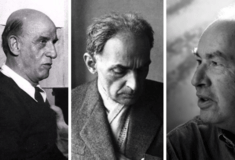

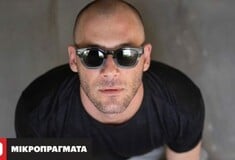
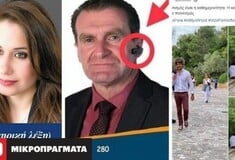

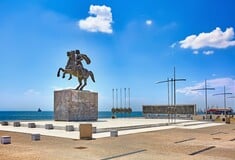
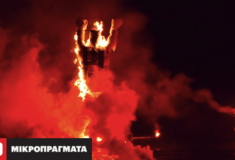
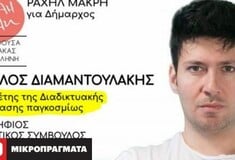

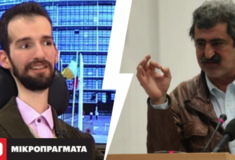

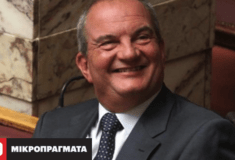

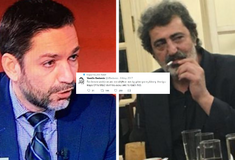

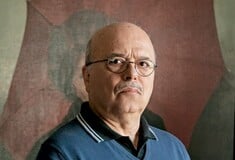
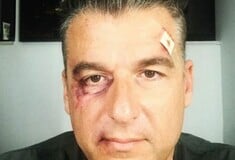
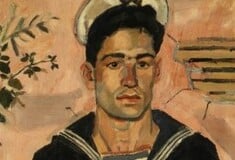
σχόλια